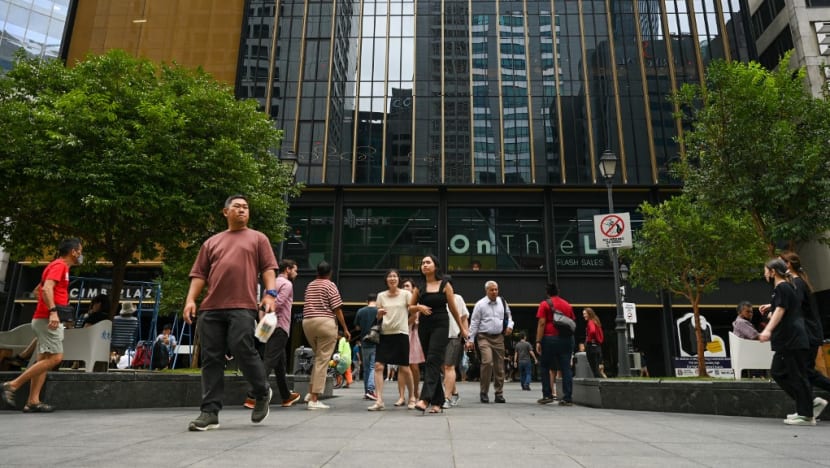SkillsFuture courses which are not career-related can lead to learning, even 'happiness' outcomes: Experts
One academic says the government shouldn't be "micromanaging" Singaporeans when it comes to gaining knowledge.

A lunchtime crowd is seen at Raffles Place in Singapore on Oct 6, 2022. (File photo: AFP/Roslan Rahman)

This audio is generated by an AI tool.
SINGAPORE: Some Singaporeans may choose to use their SkillsFuture credits on courses seemingly irrelevant to careers. But this can still serve other purposes like lifelong learning, plain interest or just general well-being, said HR experts.
“Using the credits on non-career related courses does not take away from the original aim of the scheme,” said Associate Professor Trevor Yu of the Nanyang Technological University’s Nanyang Business School, pointing out that it was to get people started on "a lifelong journey of constant learning".
When they turn 25, all Singaporeans are given S$500 (US$371) in SkillsFuture credits that they can use on any registered course.
In his Budget speech in February, Deputy Prime Minister Lawrence Wong announced that the programme would be expanded – Singaporeans will receive S$4,000 more in credits when they turn 40, but this amount can only be used on selected courses that result in better employment outcomes.
According to the SkillsFuture portal, there are currently over 29,000 courses available for those seeking to use their basic-tier credits.
Among these courses are options which can appear more esoteric or even raise eyebrows, such as when netizens last month ridiculed a S$580 class on toilet cleaning.
But experts urged against taking a "narrow" view and dismissing courses as "frivolous".
“As it is becoming more common to have two or more different careers across adult working age, what may be non-career related in the present could be a very viable proposition in the future," said Assoc Prof Yu.
Whether the knowledge gained from a course is "useful" ultimately depends on the individual, said Assistant Professor Aaron Ng from the Singapore Institute of Technology (SIT).
The lecturer in digital communications and integrated media added that individuals should think more deeply about the trajectories of their careers and lives to make effective use of the SkillsFuture credits.
“The government can help by lowering the barriers to gaining knowledge, but I don't think the government should be micromanaging the individual's future.”
CLEANING UP OFFERINGS
In response to discussion on the toilet cleaning course, SkillsFuture Singapore and the National Environment Agency said it has been part of training requirements for workers in cleaning agencies since the end of 2022.
It is also one of the modules applicable to job levels under the Progressive Wage Model for cleaners, through which these workers can earn higher wages as they undergo more training.
Elsewhere on the SkillsFuture portal, a quick browse throws up a S$386 basic xiangqi or Chinese chess course; a S$1,200 artisanal soap-making workshop; and a S$590 lesson on how to “Stay Calm and Stand Up" to be "more assertive in the workplace”.
Ms Jaya Dass, Asia-Pacific managing director of Randstad, said the SkillsFuture website could definitely be cleaned up to either make it easier to find courses or audit those that are outdated.
“Having said that, this is not about making it such that SkillsFuture becomes a job-related training search. I might still want to take courses, which are not related to my work, that enrich me,” she added.
“It might be something I’m passionate about, and I’m considering going into something else in the future.”
TWO TIERS, TWO DIFFERENT PURPOSES
The national SkillsFuture movement was launched in 2015. Since then, training participation rates have increased from 35 per cent to around 50 per cent in 2022.
Close to 40 per cent of Singaporeans in their 30s have used their base S$500 credits, compared with about 25 per cent of those aged 60 and above.
The purpose of the new SkillsFuture scheme announced in February is to enable mid-career transitions to in-demand industries, hence the targeted nature of the S$4,000 top-up in credits, said SIT’s Dr Ng.
“For people who are not keen on these industries, they can still rely on the earlier SkillsFuture scheme to explore industries outside of the industry they are currently employed in,” he added.
“Both types of schemes serve very different purposes and do not affect each other.”
Dr Xu Le of the National University of Singapore’s business school noted that the new measure seeks to encourage people to upskill or reskill, to maintain the competitiveness of Singapore’s workforce.
On the other hand, one of the objectives of the S$500 in basic tier SkillsFuture credits is to incentivise individuals to pursue their genuine interests and cultivate lifelong learning habits, she added.
“I believe it's crucial to maintain the flexibility of the basic tier of credits and allow individuals to choose courses they desire, even if they aren't directly related to their careers,” said Dr Xu.
“As long as these courses bring happiness and contribute to overall well-being, they can indirectly benefit their careers by promoting a healthier and happier life.”
Experts pointed to the example of Apple founder Steve Jobs, who took a calligraphy class at a time when it had no practical application in his life or career.
But when his team at Apple was coming up with the first Macintosh 10 years later, everything he learnt about typography and typefaces came back to him and was incorporated into the design of the computer.
This is why SkillsFuture courses still need to cater to diverse needs that go beyond employment, said Mr Ho Seong Kim, CEO of the Singapore Institute of Management Academy.
“These learning opportunities may not directly support immediate employment outcomes," he added. "But are nonetheless valuable for personal growth and self-discovery, which can lead to entrepreneurship."


















